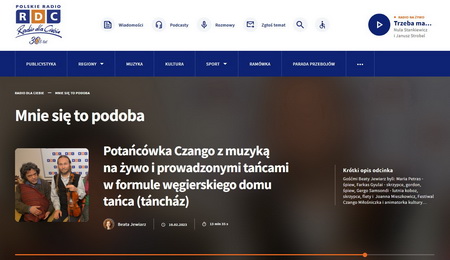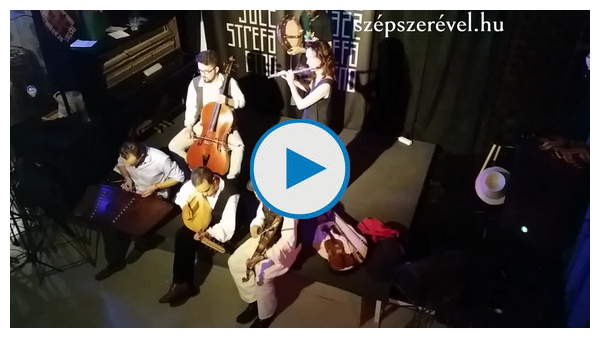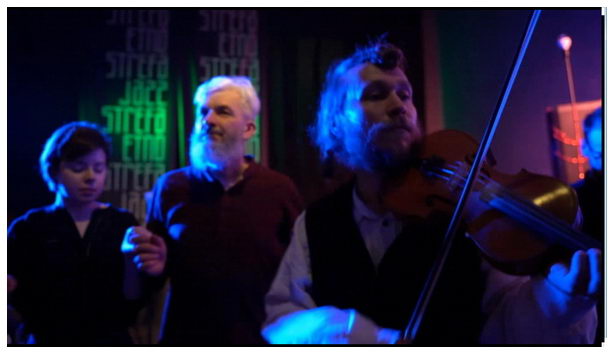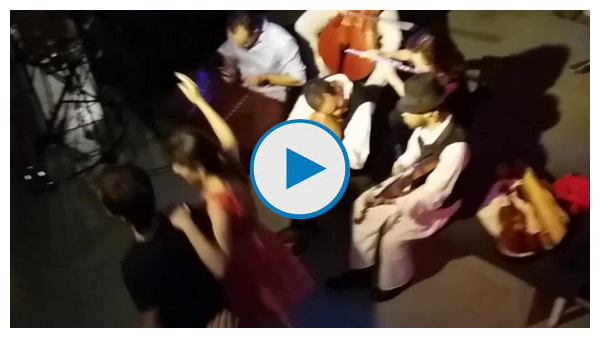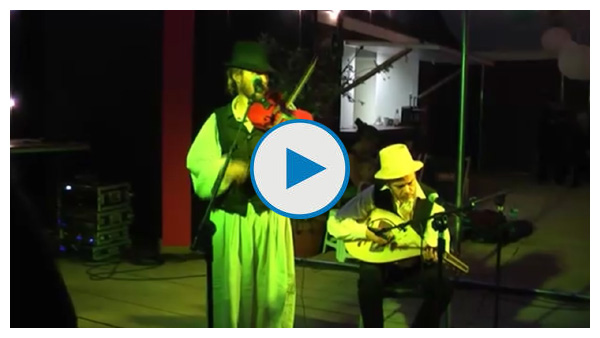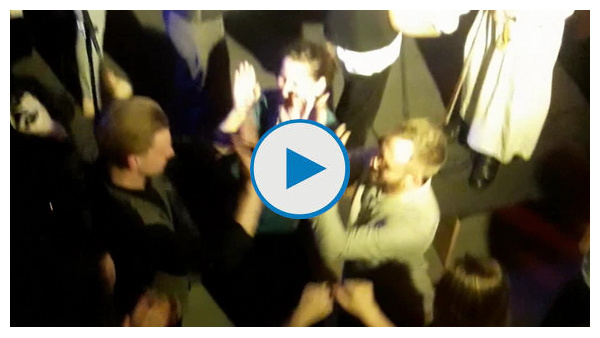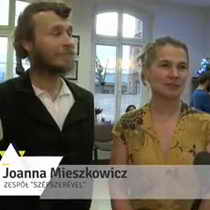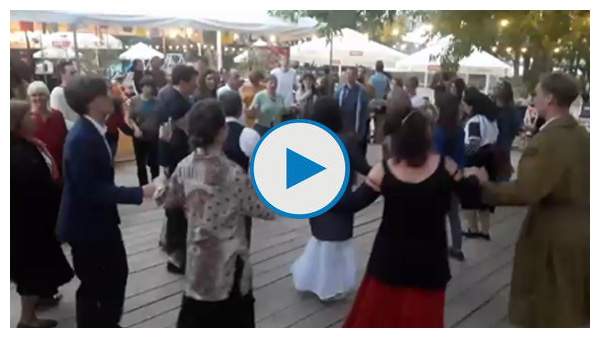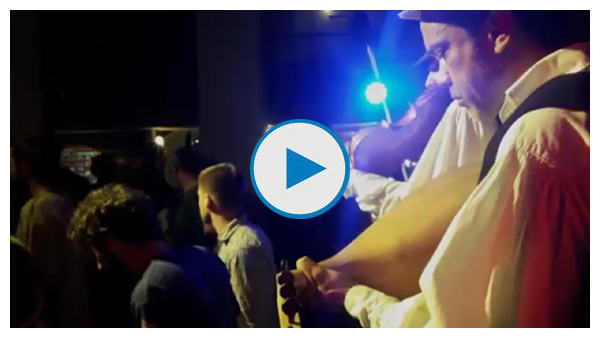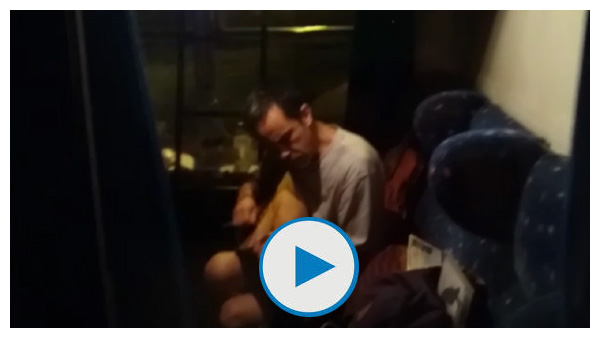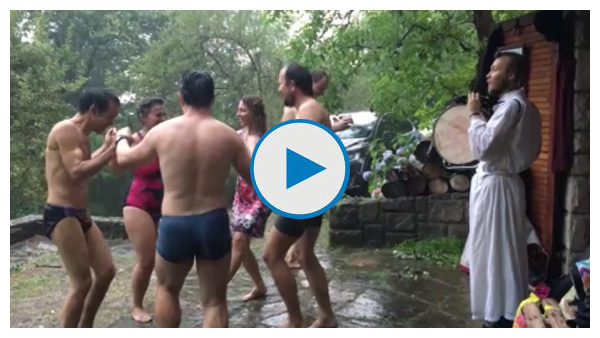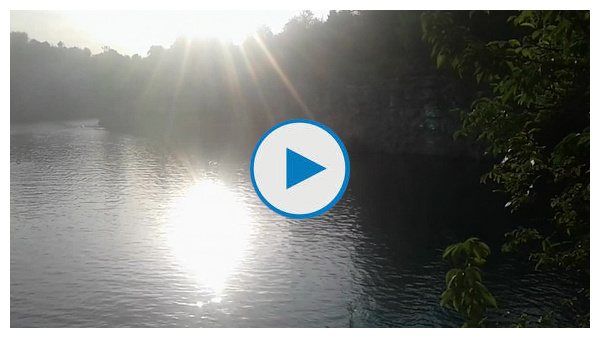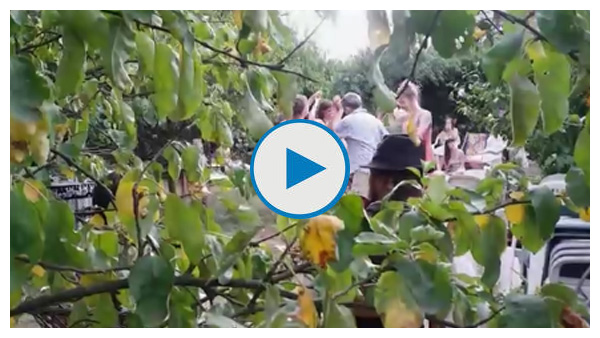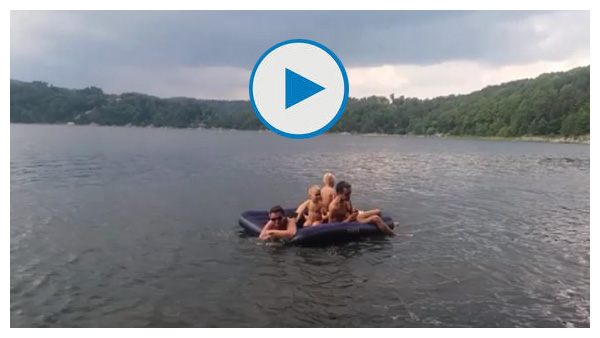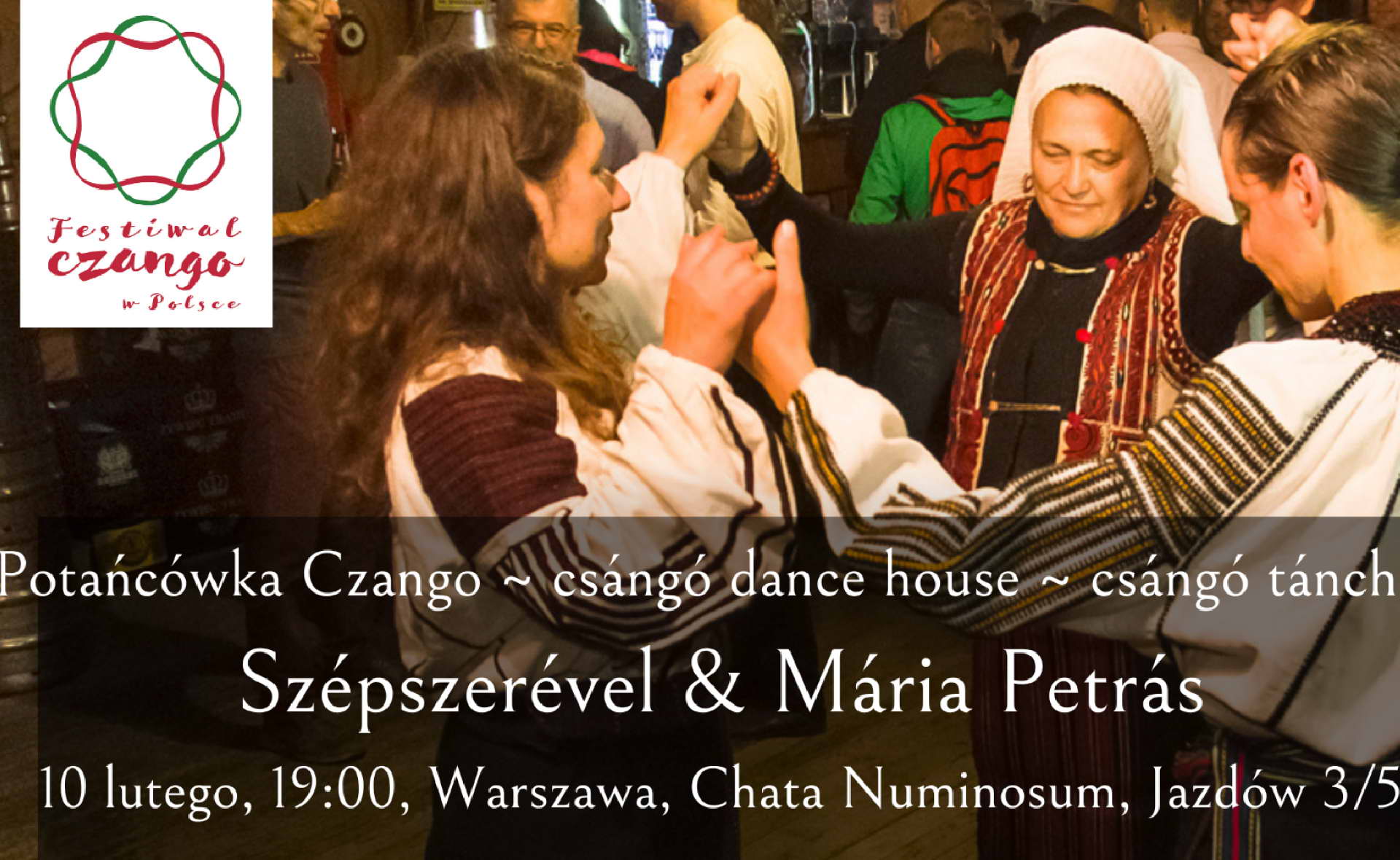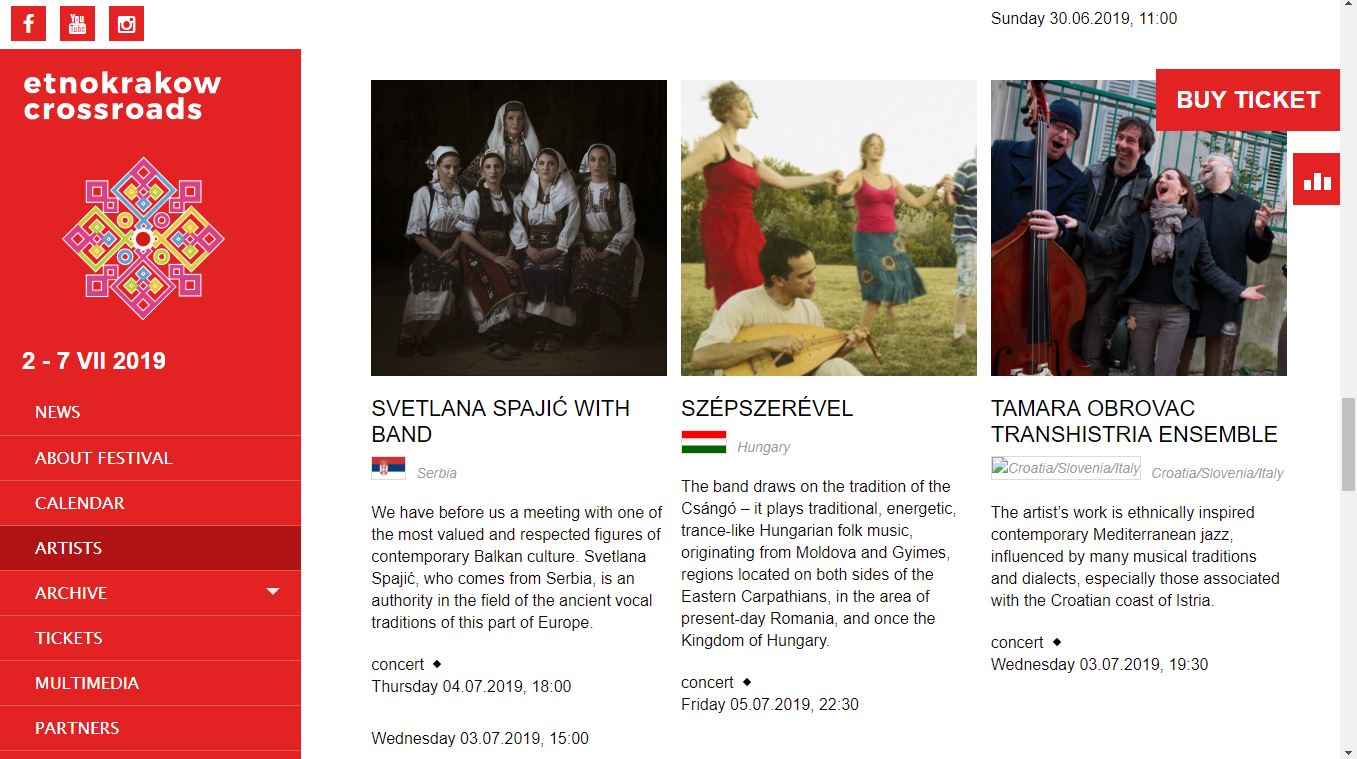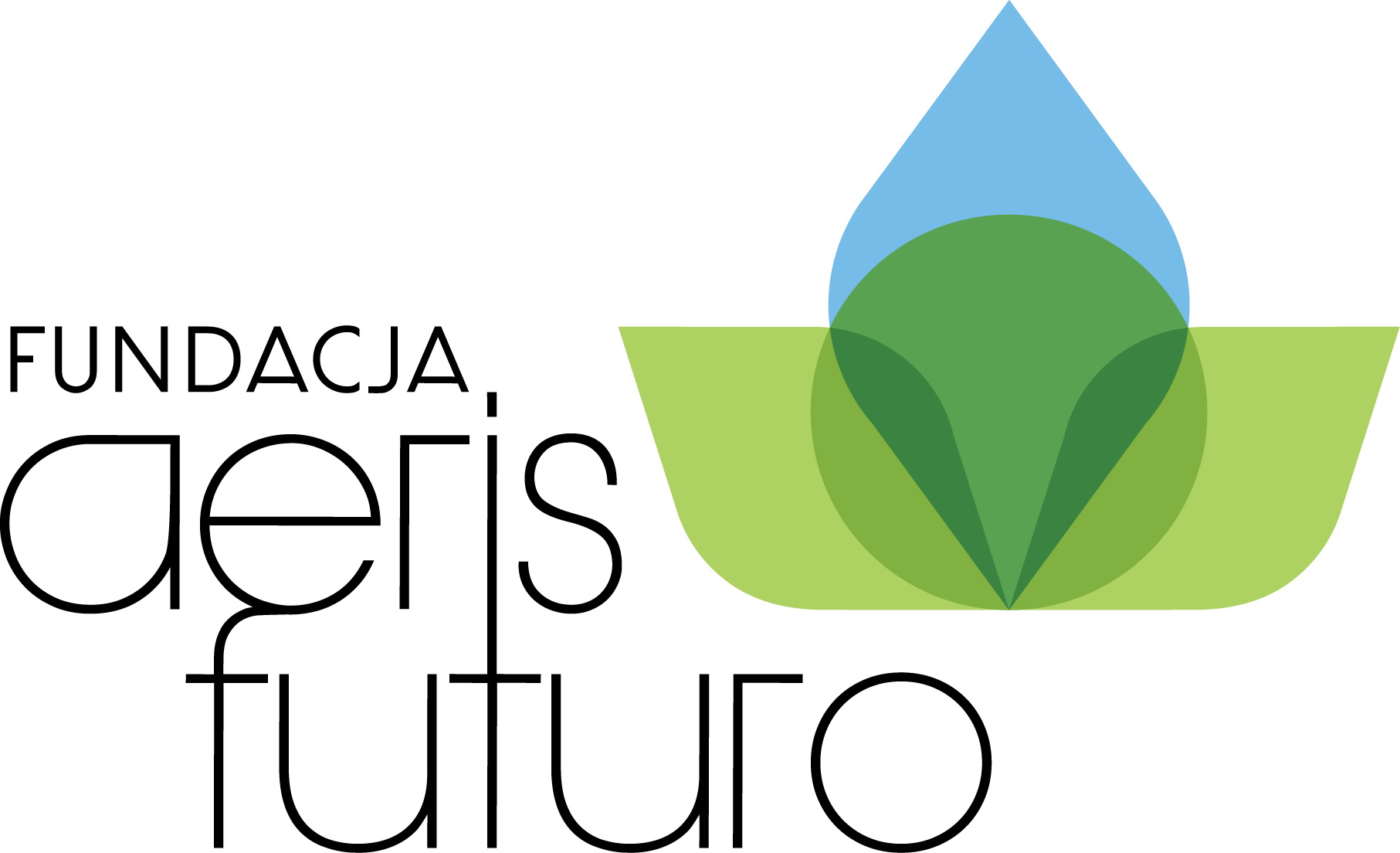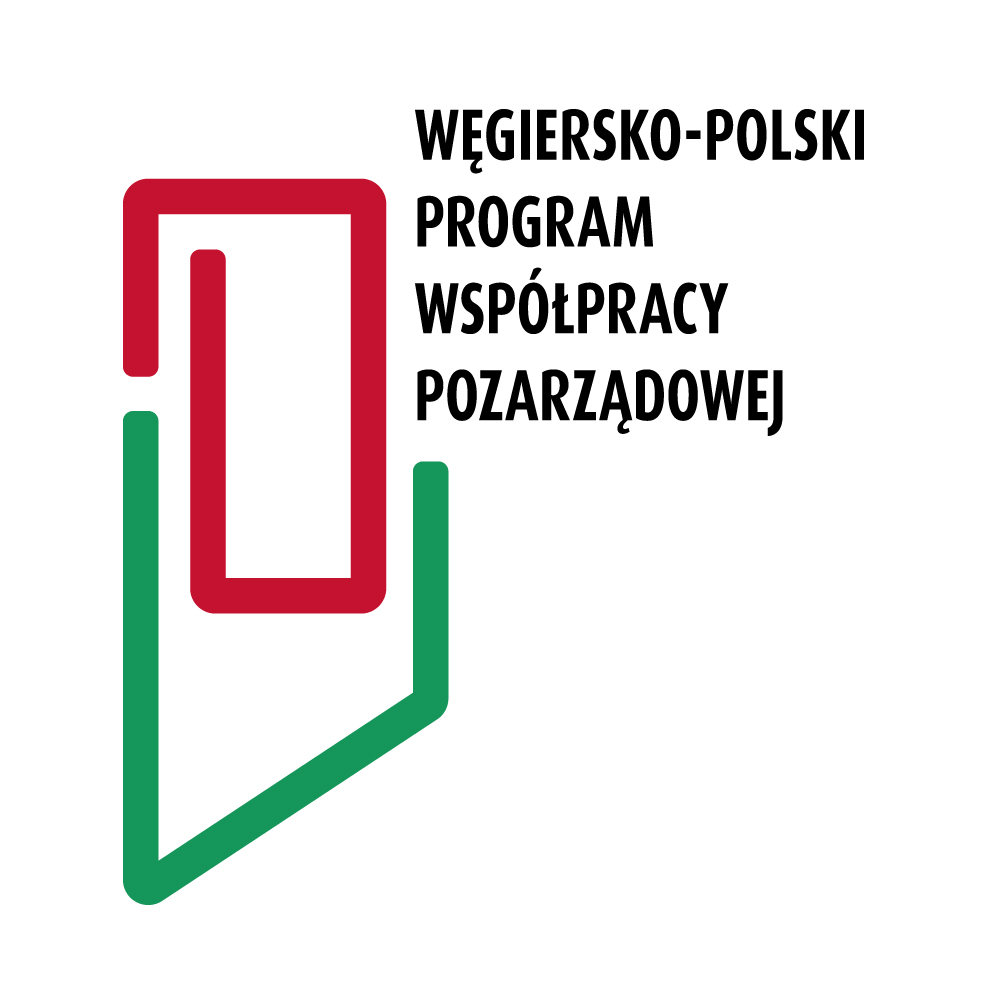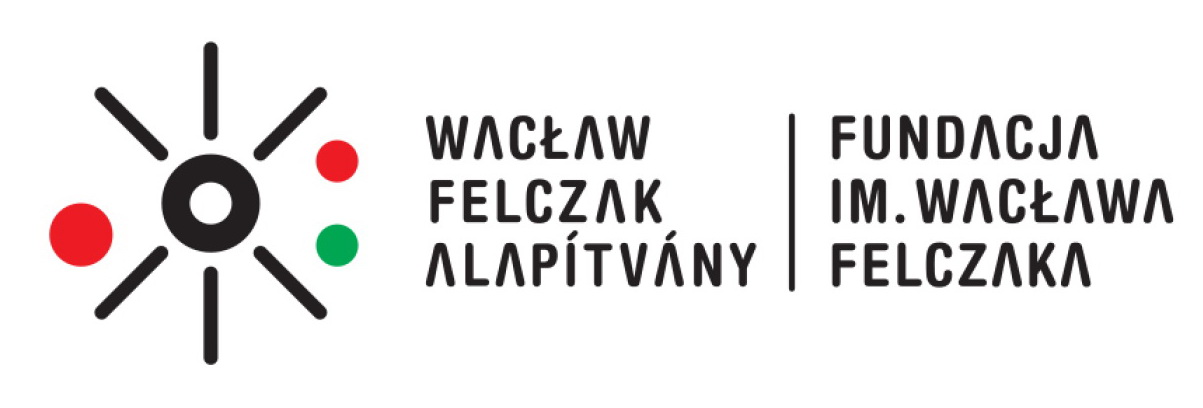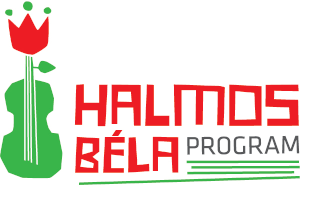2023 2023 2023 2023
IV Csángó Festival in Poland
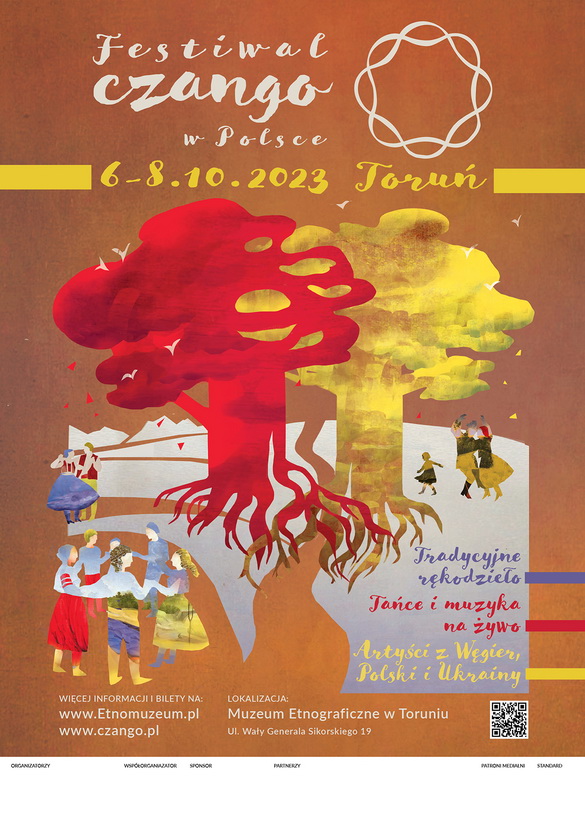
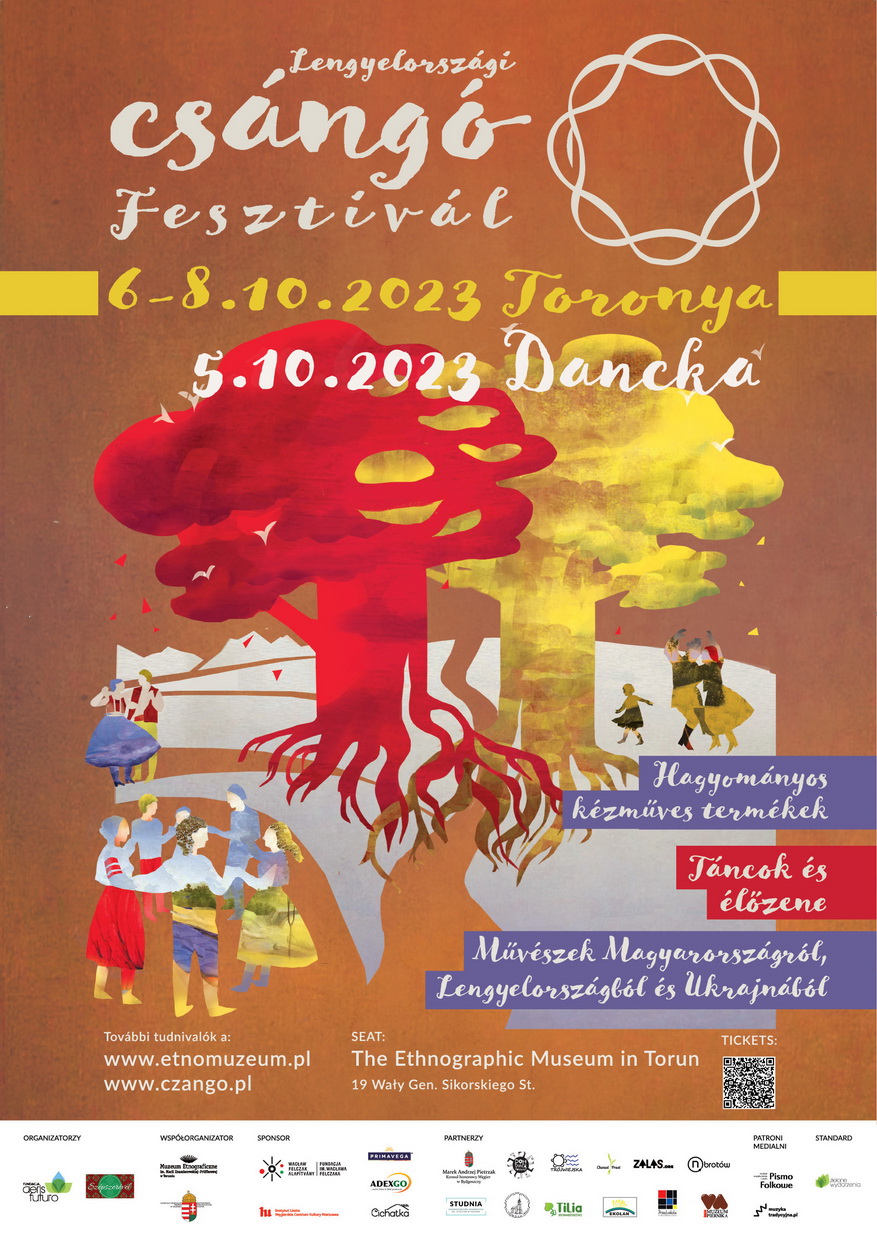
06-08.10 Toruń / Ethnographic Museum, 19 Wały Gen. Sikorskiego St.
On October 6-8, 2023 we invite you to Toruń for a celebration of the traditional culture of Hungary, Poland and Ukraine – the Csángó Festival in Poland. The Festival sustains and revives traditions, warms relationships and creates friendships between enthusiasts of the traditional cultures through the feeling of community, fun, and relaxation.
*** You can buy tickets on-line or in The Ethnographic Museum in Toruń. ***
This year's final edition will be full of various attractions and events – music, dance and singing workshops, dance parties, concerts and exhibitions. We will host a large group of artists from Hungary, including representatives of the Csángó people: from Moldva - Mária Petrás, the most famous folk singer and artistic ceramicist, and from Gyimes - musicians István Lukács and Eszter Vitos. Csángó melodies will also be played by outstanding reconstructionists and multi-instrumentalists – Gergely Sámsondi, Gyula Horváth, great flutists – Dániel Bolya and Vajk Máté Gyulai. There will also be Farkas Gyulai, the great fiddler and csángó singer, and Vince Meszaros, a specialist in music from Transylvania and Bukovina. Participants will have a great opportunity to learn csángó dances from an expert in this field – Juliá Skopp.
Melodies and chants from Polish Carpathian region will be preformed by Jan, Kacper and Zuzanna Malisz (Malisz Band form Little Beskid), and from the Polish-Ukrainian foothills by Pawel Iwan together with Ukrainian artists Maksym Nakonieczny playing the violin, Severyn Danyleiko playing the bass, and an outstanding violinist and singer Serhiy Ohrimchuk.
The musical improvisation workshop based on csángó melodies will be conducted by Kazimierz Nitkiewicz, a great trumpet player known mainly from the Warsaw Sentimental Orchestra.
We are happy to present artists and animators of traditional culture from different places: especially form Poznań – Jacek and Alicja Hałas, founders of the Poznań Dance House in 2000, csángó music and dance lovers, members of the most interesting folk formations in Poland, co-creators of international artistic and theatrical projects, Toruń – Marta Domachowska, Katarzyna Kostańska-Maziarz and Dominik Wóltański, and Gdansk – Piotr Kluczek and Magdalena Olkiewicz.
Maintaining traditions in everyday life is important – it brings nationalities together. In addition, mixed areas such as that inhabited by the Csángós and the entire Carpathian region help us to understand humanity and set an example of how to live in peace and harmony. You can find everything in folklore: every nation has its history deeply inscribed in its cultural heritage. We
want to bring out these riches and use them to enrich our lives, our health and our hearts " explain the festival organisers from the Aeris Futuro Foundation and the Szépszerével Band.
The music of the Hungarian Csángós tradition is unique – you will find medieval melodies, gypsy, Jewish, Balkan and even Polish rhythms. An advantage of csángó dances may be the fact that most of them are circle dances, so no partner is needed, and the steps are usually simple, although the tempos are sometimes very fast.
Festival of Polish and Hungarian dance houses
In Poland, we are witnessing a rivival of traditional folk culture among big city dwellers. The inspiration came from Hungary, where the dance house movement (táncház) started more than half a century ago. The Csángó Festival in Poland is a good example of the flourishing of the dance house movement and, at the same time, of traditional culture: we dance, make music and sing together. The fusion of temperaments and the explosion of joy in making music and dancing together with Polish artists have generated ideas for the next edition of the Festival.
Our dream is also to draw new people into this circle, into this atmosphere, so that they too can feel the positive emotions that we experience while already immersed in the beauty of traditional culture, the organisers add.
Ecological and social solutions in the organisation of events is our tradition
Joanna Mieszkowicz, as part of The Aeris Futuro Foundation, has been co-creating the Green Events programme since 2009. The organisation promotes pro-environmental and pro-social innovations and try to implement them when organising events. These ideas also guide the organisers on the Hungarian side, the Szépszerével band.
Green rules of the Csángó Festival includes:
Most concerts and dances will be with live music, without an artificial sound system, i.e. they will be unplugged
We avoid air conditioning, unhealthy artificial lighting, unnecessary printing and waste production
We rely on land-based public transport, carpooling, and locally also cycling and walking
We choose event venues that are well connected to different parts of the city, the region and Poland
We choose event venues adapted to people with disabilities
We focus on local food, without harmful chemicals, meat-free
We showcase and support the culinary heritage – you won't find products from international brands here
We present the cultural heritage of ethnic minorities
We support grassroots artistic and environmental initiatives – we cooperate with NGOs
We bring generations together – involving seniors and young people as well as families with young children
We unite nations and generations in the name of common values
More information at www.czango.pl and https://www.facebook.com/festiwalczango
About the organisers
From Poland: Joanna Mieszkowicz, founder of The Aeris Futuro Foundation, and long-standing President. She has been implementing innovative projects to protect and promote cultural and natural heritage. As an enthusiast of traditional Csángó dances for more then 2 decades, she participates in dance workshops, camps and dance houses (táncház). She is a creative organiser – she made her first csángó dance houses (hu: táncház) in 2008 and since 2019 she does it frequently and since autumn 2020 she has started the Csángó Festival in Poland.
From Hungary: Gergely Sámsondi and Farkas Gyulai, the Szépszerével band, has been running a dance house on Budapest's Gellert Hill every Wednesday since 2008. They learnt about music and folk customs through their own experience, as they are apprentices to village musicians mainly from Transylvania (Erdély), now an area of Romania and once the Principality of Hungary. Unfortunately, most of the indigenous artists are no longer alive, hence the even greater value for the participants here in Poland – the opportunity to touch living history.
Co-organiser: Maria Znamierowska-Prüfferowa Ethnographic Museum in Toruń (since 1959): one out of three independent ethnographic museums in Poland. The Museum basic task is accumulating, scientific working out, storage, protection, conservation and making goods of culture available for people. The Museum also accumulates documentation materials concerning ethnology as well as related sciences. It also runs educational and publishing activity as well as it co-operates with organizations possessing similar aims. The range of the Ethnographic Museum in Toruń working is the area of whole Poland, especially the terrains of Kujawsko-Pomorskie Province.
Sponsor: Wacław Felczak Foundation, Budapest
Partners:
Consulate General of Hungary in Gdansk
W tan Dance and Development Centre
Chwast Prast Vege Bistro
Dance House Poznań
Group n obrotów
Kamienica Inicjatyw
Kujawsko-Pomorskie Association of Organic Producers EKOŁAN
Maria Montessori Nursery School in Toruń
Tilia Association
Trojwiejska Association of Gdansk
Living Gingerbread Museum
Studnia academic pastoral care
Media patrons: Pismo Folkowe | MuzykaTradycyjna.pl
Contact:
Joanna Mieszkowicz
Director of the Czango Festival in Poland
This email address is being protected from spambots. You need JavaScript enabled to view it.
T: +48 693 589 391
More information at:
https://www.facebook.com/festiwalczango
www.czango.pl
02 2023: Petrás Mária exhibition, opening concert
Varsaw, Liszt institute
dance house and koncert
Varsó, Chata Numinosum
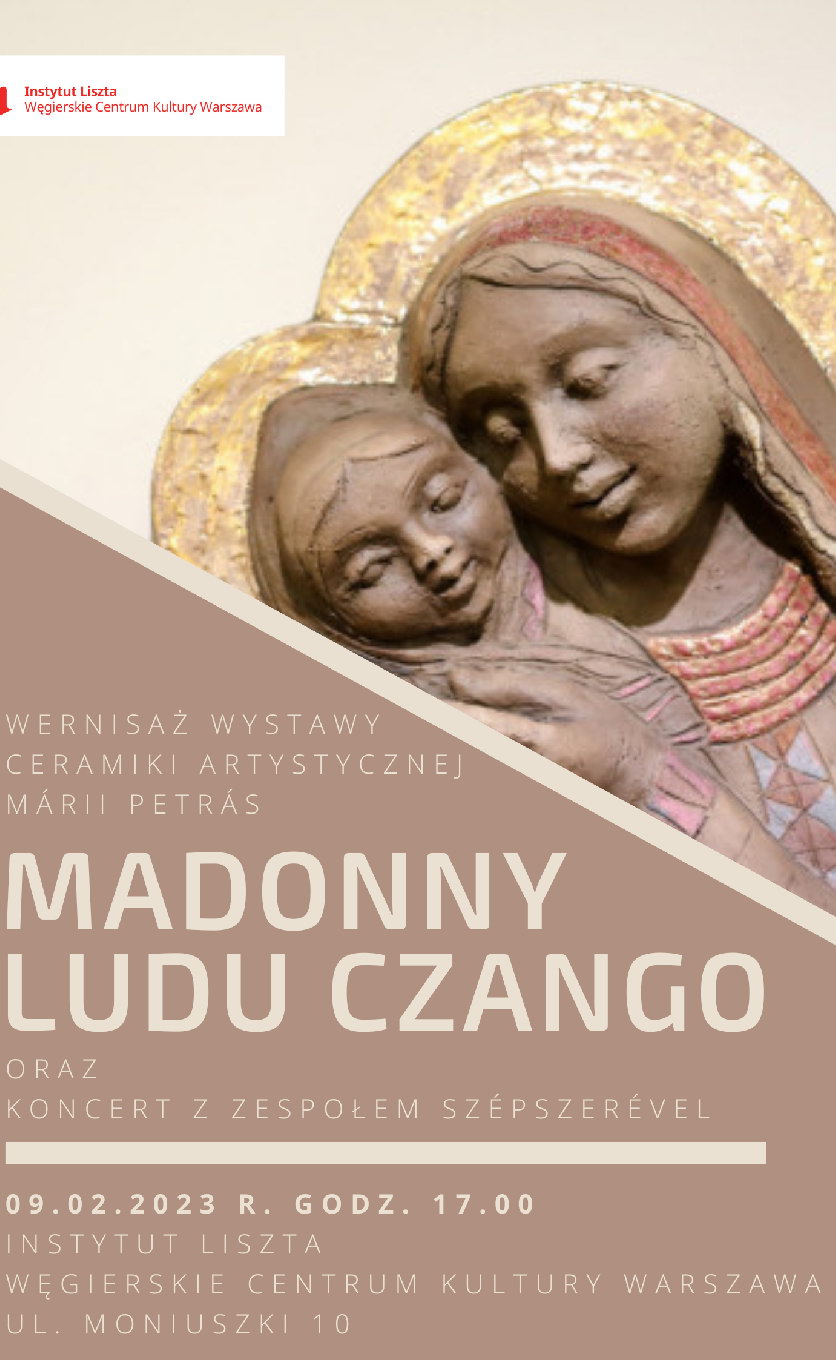
2022 2022 2022 2022
13-15. 10. 2022.
III Czango Festival in Poland - Within the circle of the Carpathian culture
Festival of Polish and Hungarian dance houses
photos here
homepage czango.pl here
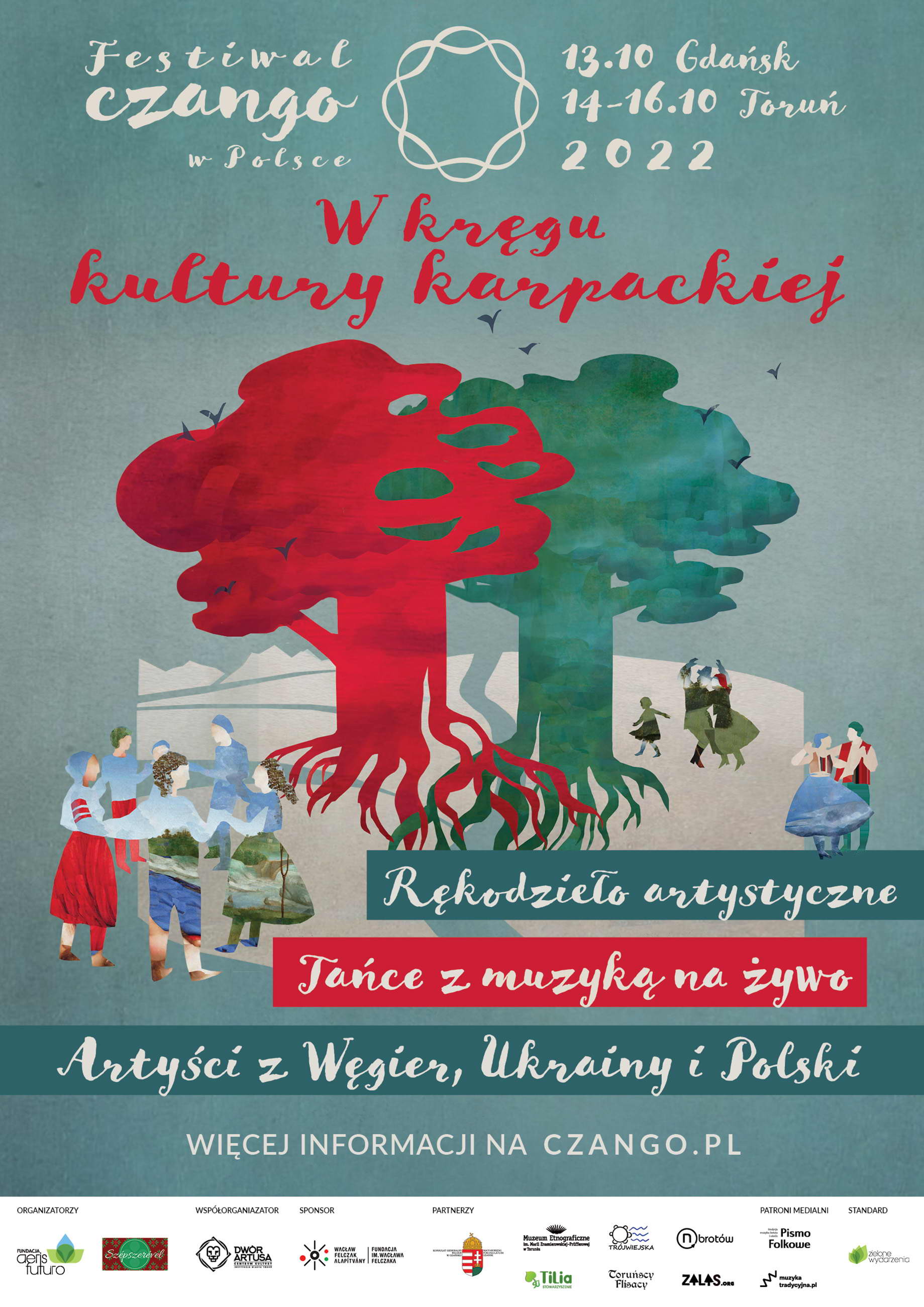
2022
2022 augusztus 23-27.:
augusztus 23: Zywiec (Beskidy)
and Jaroslaw

augusztus 26: Krakkó, Strefa klub
augusztus 27: Jaroslaw, 30. Early Music Festival - Song of Our Roots
2022. június:
Szépszerével 25/6/2022 in Warsawa, Festival Mazurki
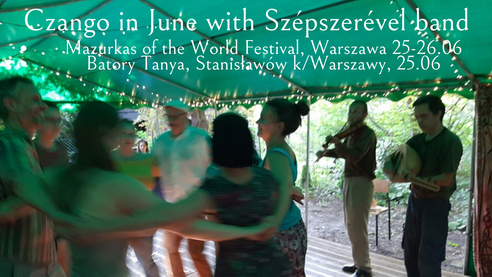
11:00-13:00 sala 205 "táncház" dance-house csángó-hungarian music from Gyimes and Moldva
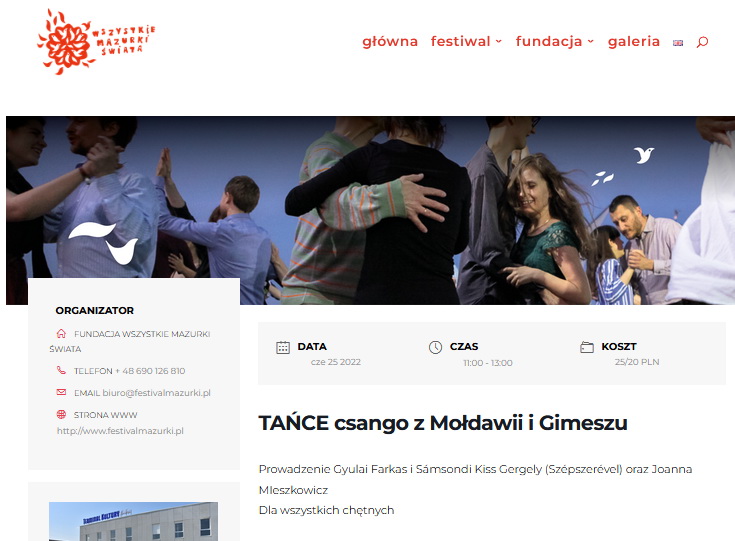
The Dance Night, is the culmination of the festival, during which rural and urban bands, both Polish and foreign, will play, along with concert participants and workshop leaders. Almost 30 bands will play to dance, and the party will last for almost 10 hours, from 7pm to 5am!
To dance, they will play and sing, among others:
Tęgie Chłopy, Janusz Prusinowski Kompania, U.S Orchestra, Hajda Banda/Гайда Банда, Orkiestra Taneczna Bonanza, Dobrzeliniacy, Orkiestra Dęta ze Zdziłowic, Kapela Serhija Ochrimczuka Oraz Oksana But, Kapela Kazimierza Marcinka z Kolbuszowej, Kapela Wiesławy Gromadzkiej z wnukami, Kapela Jana Wochniaka, Warszawsko-Lubelska Orkiestra Dęta, Kapela im. Kubiaka, Kapela Wojciechowskiego, Szépszerével.
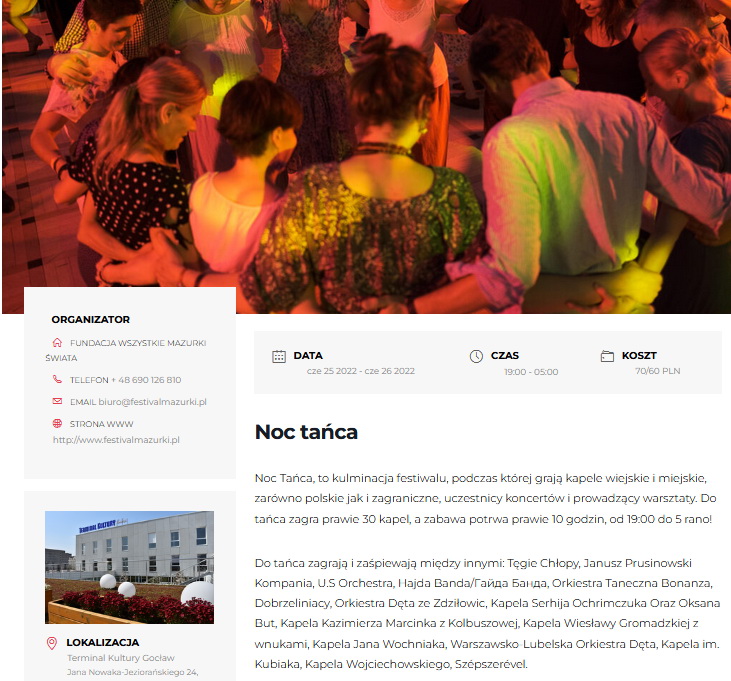
Folwark Batorówka - Bathory Tanya - Báthory tanya INFO, HOMEPAGE
park przyjaźni polsko - węgierskiej, kawałek Węgier w Polsce. Węgierskie jedzenie.
Koncert i tance Csángó - Csángó dancehouse
25.06.2022. 16:30
3-4-5. 10. 2020.
archív - 3. 10. 2020. 8 pm. Warszawa, "táncháztalálkozó"
Noc Tańca - Wszystkie Mazurki Świata 2020 - cz. 1
Szépszerével group - Csángó dancehouse at record here: 1:24:00 - 1:51.00 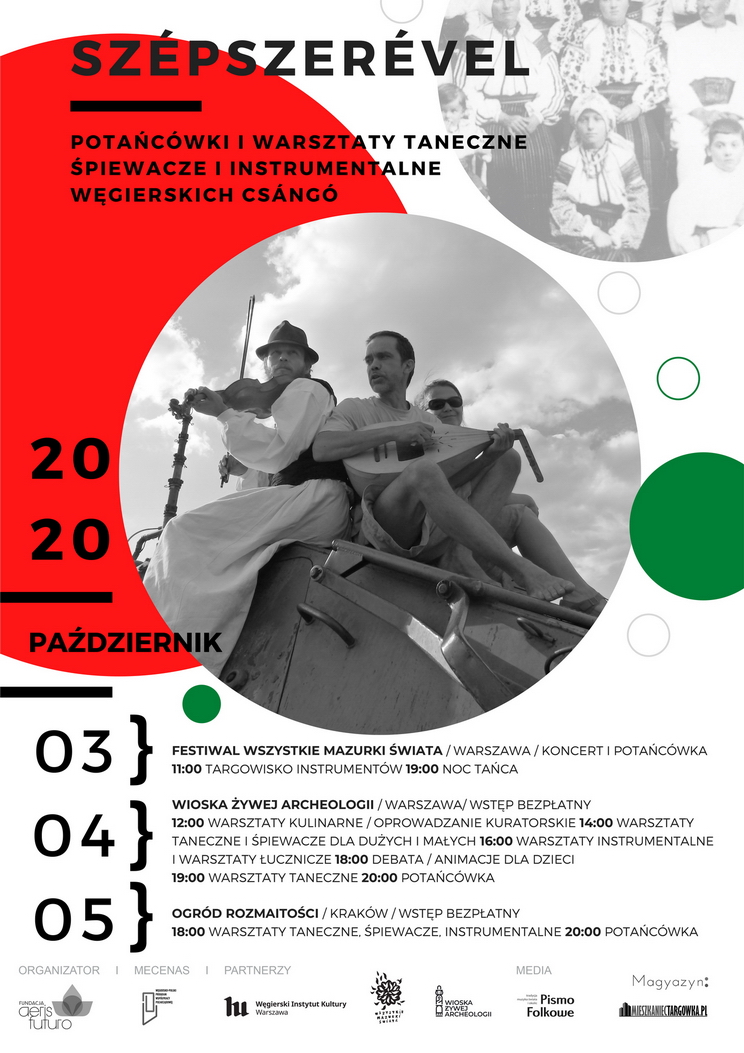
In the circle of Hungarian and Polish culture
Hungarian folk music and folk dancing workshops in Poland
Program
3rd Oct (Saturday) Warsaw
Mazurkas of the World Festival / concert and dance party
http://www.festivalmazurki.pl/
( http://www.festivalmazurki.pl/en/home/ )
http://www.festivalmazurki.pl/
11:00 Instruments Fair
19:00 Dance Night party
4th Oct (Sunday) Warsaw
Live Archaeology Village https://www.facebook.com/LiveArchaeologyVillage/
12:00 Hungarian food goes vegan workshop / visiting the village
14:00 dancing and singing workshop part I for adults and kids
16:00 instruments workshop (Szepsze) / Hungarian archery workshop
18:00 debate / kids workshop
19:00 dancing workshop II
20:00 traditional dance party
5th (Mon) Krakow
Ogród rozmaitości/ Art Freeq https://www.facebook.com/artfreeq
18:00 dancing, singing and instruments workshops
20:00 traditional dance party
Organising instutution: The Aeris Futuro Foundation – www.aerisfuturo.pl
Patron: Commission for Hungarian-Polish programme for non-governmental cooperation ( https://varso.mfa.gov.hu/hun and https://www.gov.pl/web/diplomacy )
Partners: Hungarian Culture Institute in Warsaw - Varsói Magyar Kulturális Intézet https://www.facebook.com/hunginst ; Mazurkas of the World Foundation http://festivalmazurki.pl/; Live Archaeology Village, Warsaw https://www.facebook.com/LiveArchaeologyVillage/ ; Ogród rozmaitości w Krakowie
Media: Magyazyn.pl Magyazyn.pl ; mieszkaniectargowka.pl ; zielonewydarzenia.pl
19.01.2020.:
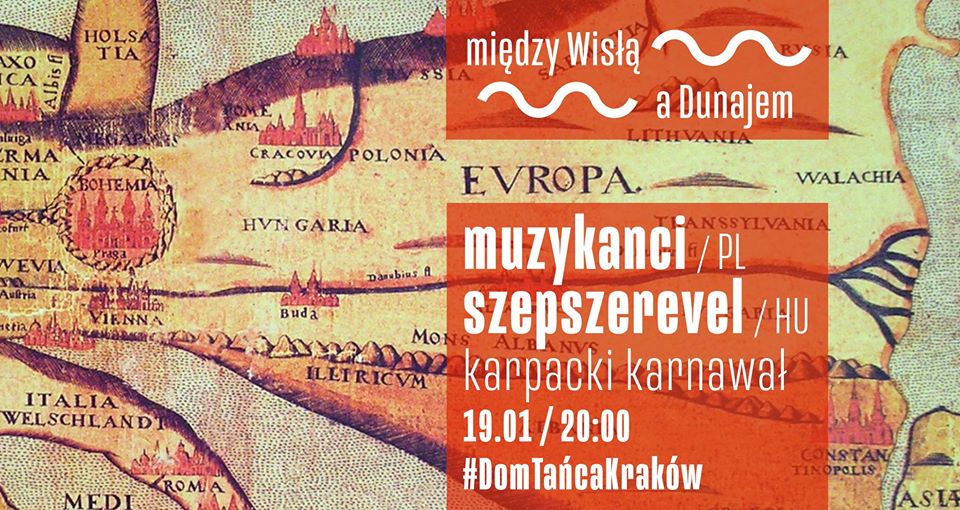
Dance feast on Sunday January 19th in the deep ecology attitude thanks to Aeris Futuro Foundation
We invite to the Carpathian Carnival party in Strefa Club in Krakow, street św. Tomasza 31.
18:00-19:30 – Csángó dance workshop, from 20:00 dance party with great bands - Muzykanci [PL] and Szépszerével [HU].
Muzykanci band started the movement of dance houses in Poland in the late 90s of XX c., my love to etno music and dance started thanks to them. Now, we will meet together with my Hungrian friends, who are a part of the movement in Hungary. I am so happy about that <3 and all that with deep ecology attitude with Aeris Futuro :)
MUZYKANCI [ muzykanci ] - one of the most interesting group at the Polish folk music scene, co-created by charismatic artists of Polish ethno scene, among others: singer and violinist Joanna Slowinska, violinist and composer Stanislaw Slowinski and singer and multiinstrumentalist Jacek Halas. Group – appreciated by critics and audiences – was founded in 1997 and quickly became a sensation on the Polish music scene. Its members played with equal success at weddings as well as in prestigious concert halls in Poland, Europe, Asia, North and South America. In the last seasons Muzykanci concerts at renowned festivals ethno and world music: Polish Radio New Tradition (Warsaw), EtnoKrakow/Crossroads (Krakow), Brave Festival (Wroclaw), Ethnoport (Poznan), Budapest Ritmo, Budapest Folk Fest (Budapest), Crossculture Festival Warsaw / Sounds Like Poland, in Korea (Jeonju International Sori Festival, Ulsan Cheoyong World Music Festival), WOMEX Budapest, WOMAD UK, WOMAD Chile and many others.
The winners of many prestigious awards, including the Grand Prix competition of the Polish Radio New Tradition Festival, Grand Prix Euro Folk Festival and the prestigious title: Folk Phonogram of the Year with their debut album “Muzykanci” – one of the most important discs in the history of Polish folk. Subsequent years saw the releases which developed both Polish folk music and Lemko, Slovak, Hungarian, and Jewish themes. One of these was the album “A na onej górze...” continuing threads started on the debut album. Another: “Gore gwiazda” – brought traditional pastorales and carols, while “Musicians and Hradišťan” was a studio and live album recorded in the Czech Republic with the participation of the Moravian group of Jiří Pavlica. Muzykanci have had numerous recordings for Polish Radio, Polish TV and other European broadcasters. New album of Muzykanci group, recorded by BBC Radio at Womex Budapest 2015 is planned for spring 2017.
Muzykanci are among the precursors of sound based on acoustic instruments and referring directly to the folk template. That plus a huge stage expression, dynamism, excellent vocal parts – sung in harmonies – still emphasises the originality and attractiveness of the group. Muzykanci are today one of the biggest concert attractions on the folk scene. A journey through time and space: in the footsteps of rural musicians, gypsy caravans, and klezmer bands... Every concert of Muzykanci heralds an artistic event.
Muzykanci band started the movement of dance houses in Poland in the late 90s of XX c., a lot of people started to love etno music and dance thanks to them – explain Joanna Mieszkowicz, co-organiser and a dance teacher. This time, they will meet together with us, who are a part of the movement in Hungary. So we are very happy about that. And why is that with deep ecology attitude? as inspired by „The secret life of trees” we say that the csango music is like mycelium which conects and feed trees-dancers.
Joanna Słowińska – vocal, violin
Jan Słowiński – viola, folk bass, vocal
Stanisław Słowiński - violin
Jacek Hałas – vocal, hurdygurdy, accordeon, jew's-harp
Alicja Hałas – folk drums, gordon
SZEPSZEREVEL group [HU] - finds its inspiration in Csángó tradition, playing - traditional, energetic, trance - Hungarian folk music, descending from Moldova and Ghimes - regions lying on both sides of Eastern Carpathians, in nowadays Romania, historical Kingdom of Hungary.
Members of the band live in Budapest, and there, every Wednesday, host the táncház party (literally: dance house, a traditional folk dance party) on the Gellert Hill. They learnt folk music and traditions through their own experience, they are students of rural musicians, mainly from Transylvania.
Gyulai Farkas plays the violin, flutes and kaval, and Sámsondi Gergely plays the kobza and dulcimer. They turn to the oldest forms of folk music, promoting traditional instrument tuning, as well as melodies, musical scales, songs and dances at appropriate tempos.
They are happy to teach the audience their songs and lyrics (!) so that everyone can join as a chorus. The advantage of the dances they offer is the fact that most of them are circle dances, so you don't have to have a partner, and the steps are usually simple, although the pace can be very fast.
Gyulai Farkas - violin, flutes, vocal
Sámsondi Kiss Gergely – kobza, violin
The entrance for workshop is free of chargé, CARPATHIAN - tickets: 25 PLN (online), 30 PLN (at the gate).
More information on https://www.facebook.com/events/504560576857143/
2019
Między Wisłą a Dunajem / Between Danube & Vistula
Szépszerével [HU] meets Polish folk musicians
21.11 | Warszawa | Chata Numinosum | ul. Jazdów 3/5
22.11 Kraków | Klub Strefa #FonóKraków | ul. św. Tomasza 31
28.11 Toruń | n obrotów / WEJśCIóWKA | Plac Teatralny 1
29.11 Toruń | Muzeum Etnograficzne im. Marii Znamierowskiej-Prüfferowej w Toruniu | Wały gen. Władysława Sikorskiego 19
Rozstaje / Crossroads Association would like to invite you to a series of meetings: 'Between Danube & Vistula' and, which will be hosted by a Hungarian group Szépszerével. On the route of following musical events (Warszawa - Kraków - Toruń ) the band will conduct workshops on the dances of Csángó tradition, and share the stage with musicians representing different shades of Polish traditional music (Kapela Mazowiecka, Raraszek, TTMS, agregandado).
Szépszerével finds its inspiration in Csángó tradition, playing - traditional, energetic, trance - Hungarian folk music, descending from Moldova and Ghimes - regions lying on both sides of Eastern Carpathians, in nowadays Romania, historical Kingdom of Hungary.
Members of the band live in Budapest, and there, every Wednesday, host the táncház party (literally: dance house, a traditional folk dance party) on the Gellert Hill. They learnt folk music and traditions through their own experience, they are students of rural musicians, mainly from Transylvania.
Gyulai Farkas plays the violin, flutes and kaval, and Sámsondi Gergely plays the kobza and dulcimer. They turn to the oldest forms of folk music, promoting traditional instrument tuning, as well as melodies, musical scales, songs and dances at appropriate tempos.
They are happy to teach the audience their songs and lyrics (!) so that everyone can join as a chorus. The advantage of the dances they offer is the fact that most of them are circle dances, so you don't have to have a partner, and the steps are usually simple, although the pace can be very fast.
21.11 | Warszawa | Chata Numinosum | ul. Jazdów 3/5
19:00-20:30 workshop: dances of Csángó tradition [free admission]
21:00 dance party with Szépszerével [HU] & Kapela Mazowiecka [PL] [free admission]
https://www.facebook.com/ChataNuminosum/ http://chata.numinosum.pl/
22.11 Kraków | Klub Strefa / FonóKraków | ul. św. Tomasza 31
18:00-19:30 workshop: dances of Csángó tradition [free admission]
20:30 dance party with Szépszerével [HU] & Raraszek [PL] [free admission]
https://www.facebook.com/StrefaKrakow/
28.11 Toruń | n obrotów / Kawiarnia WEJśCIóWKA | Plac Teatralny 1
17:00-19:00 singing workshop with Szépszerével [HU], N-obrotowa Grupa Śpiewacza [PL] [free admission]
20:00-22:00 instrumental workshop led by the members of Szépszerével [HU], with the participation of, among others, the TTMS formation and agregandado band [free admission]
https://www.facebook.com/events/1043985765948186/
29.11 Toruń | Muzeum Etnograficzne | Wały gen. Sikorskiego 19
11:00-12:30 workshop: dances of Csángó tradition [free admission]
18:30-19:45 concert: Szépszerével [HU] / introduction to Csángó culture
20:00 dance party with Szépszerével [HU] [free admission]
https://www.facebook.com/etnomuzeum.torun/ |http://etnomuzeum.pl/dzien-kultury-csango-z-zespolem-szepszerevel/
organizer:
Rozstaje/Crossroads Association [Rozstaje: u Zbiegu Kultur i Tradycji. Stowarzyszenie]
financial support:
Instytut Felczaka / Instytut Współpracy Polsko-Węgierskiej im. Wacława Felczaka w Warszawie
partners:
Fundacja Aeris Futuro, klub Strefa Kraków, #FonóKraków Fonó Budai Zeneház, Chata Numinosum, n obrotów WEJśCIóWKA Toruń, Muzeum Etnograficzne im. Marii Znamierowskiej-Prüfferowej w Toruniu
illustration: fragment of 'EUROPA REGINA' map, Johannes Putsch / 1537
-------------------------------------------------------------------------------------
MORE PICTURES about the trip at TÉKA menu - click here
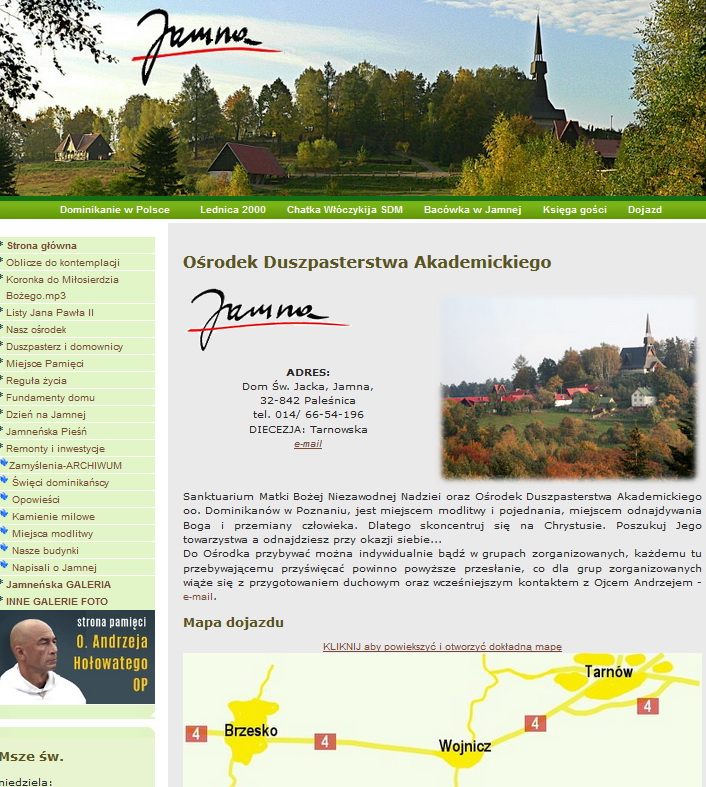
Bogaty program edukacyjny obejmuje warsztaty pieśni serbskich (Svetlana Spajić), ukraińskich (Młyneczek), rosyjskich (Virtualnaja Derevnia), warsztaty bluesa (The Swing Experience), warsztaty tańców tradycyjnych: polskich (Piotr i Bogumiła Zgorzelscy, Raraszek) i włoskich (Lassatil Abballari). Przed nami też – jak co roku – noce tańca w klubie Strefa i w klubie Alchemia: tym razem z muzyką włoską (Lassatil Abballari), w energii balfolk (Martin-Vojta-Mikulas / Mr. Folxlide), etnoelectro ( Kfjatek / Red Sun Rising / RSS B0YS) i dedykowane tańcom tradycyjnym Europy Środkowej: Raraszek i Pokrzyk (Polska) / Muzička & Dragúni (Słowacja) / Szépszerével (Węgry).
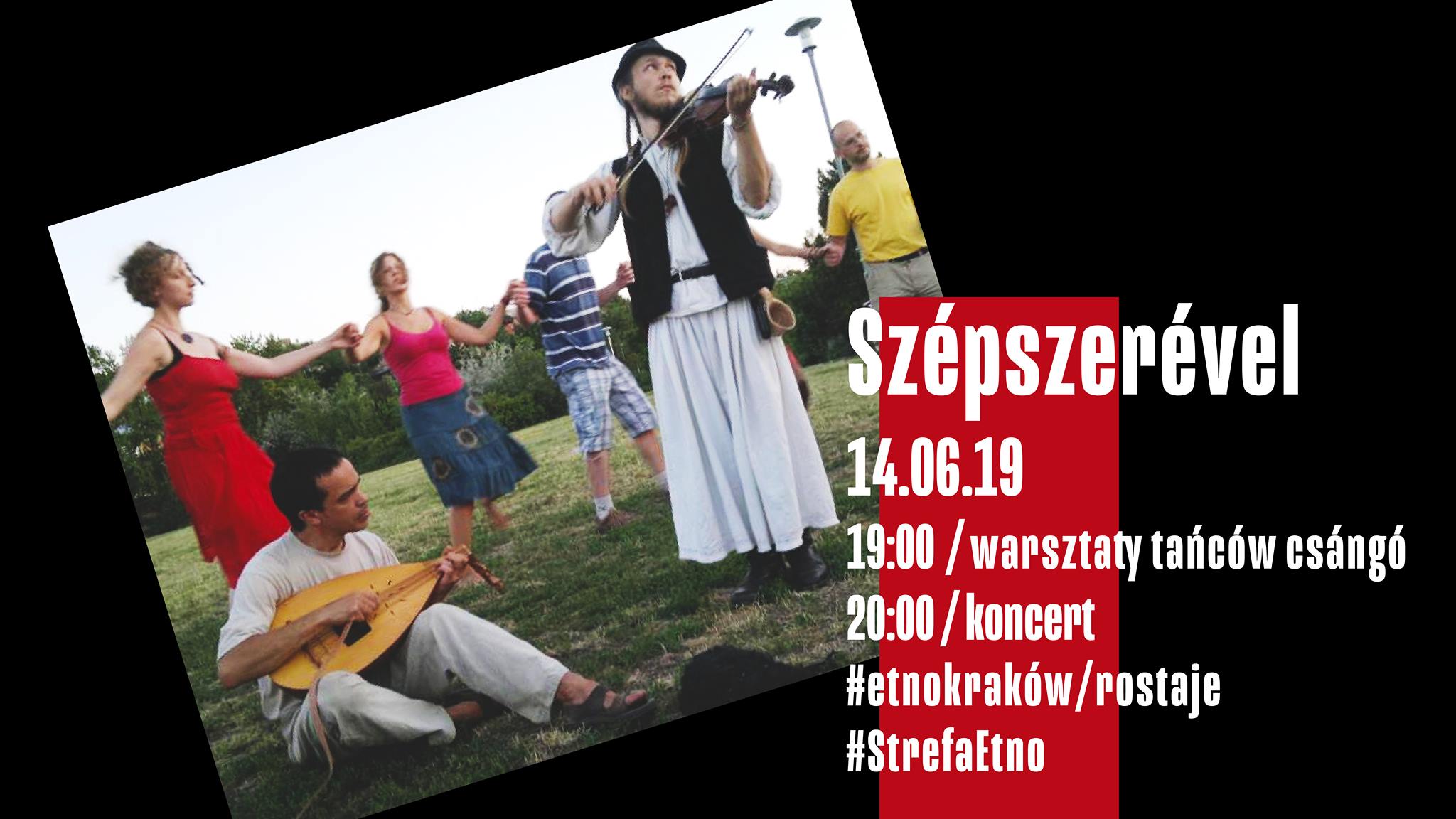
PROGRAM:
14. 06. FRIDAY First event but I will make a special event
https://www.facebook.com/events/2270784063184994/
https://www.facebook.com/events/2694325670584440/?active_tab=about
it is going to be unplugged ;) You play FOR CLIMATE - for protection of Mother Earth :) EtnoKraków/Rozstaje Prolog / Szépszerével [HU]
Details
EtnoKraków/Rozstaje PROLOG: SZÉPSZÉRÉVEL [HU] / 14.06 / 19:00 warsztaty tańców csángó / 20:00 koncert / wstęp (całość): 10z
ł : : : : : : : : : : : : : : : : : : : : : : : : : : : : : : : : : : : : : : : : : : : : :
Zespół czerpie z tradycji Czangów (Csángó) – gra tradycyjną żywiołową, energetyczną, transową węgierską muzykę ludową, wywodzącą się z rejonów Mołdawii i Gimeszu (Gyimes), regionów, które leżą po obu stronach Karpat Wschodnich, na terenie obecnej Rumunii, a kiedyś Królestwa Węgierskiego. Członkowie zespołu mieszkają w Budapeszcie, ale poznali muzykę i ludowe zwyczaje dzięki własnemu doświadczeniu, są bowiem uczniami wiejskich muzykantów, głównie z Erdély w Siedmiogrodzie. Gyulai Farkas gra na skrzypcach, fletach i kavalu, Sámsondi Gergely gra kobozie (kobzie) i cymbałach. Przyznają, że bardzo lubią najstarsze formy muzyki ludowej. Gotowi są wymieniać się między sobą instrumentami. Propagują tradycyjne stroje instrumentów, takież melodie, skale muzyczne, piosenki i tańce w odpowiednich tempach. Chętnie uczą publiczność swoich tańców, które grają, a także piosenek, wraz tekstami (!), aby wszyscy mogli dołączyć do śpiewu podczas tańca. Atutem proponowanych przez nich tańców może być fakt, że większość z nich to tańce w kręgu, zatem nie trzeba mieć partnera lub partnerki, a kroki są zazwyczaj proste, choć tempa bywają bardzo szybkie…
: : : : : : : : : : : : : : : : : : : : : : : : : : : : : : : : : : : : : : : : : : : : :
Gyulai Farkas – skrzypce, flety, kaval
Sámsondi Gergely – koboz (kobza), cymbały
Kajla Gergely - nauczyciel tańca
Legány Réka - nauczycielka tańca
15. 06. SATURDAY10-15
on 15th there will be a family picnic in a Steiner school in Krakow and u r welcome to play somewhere between
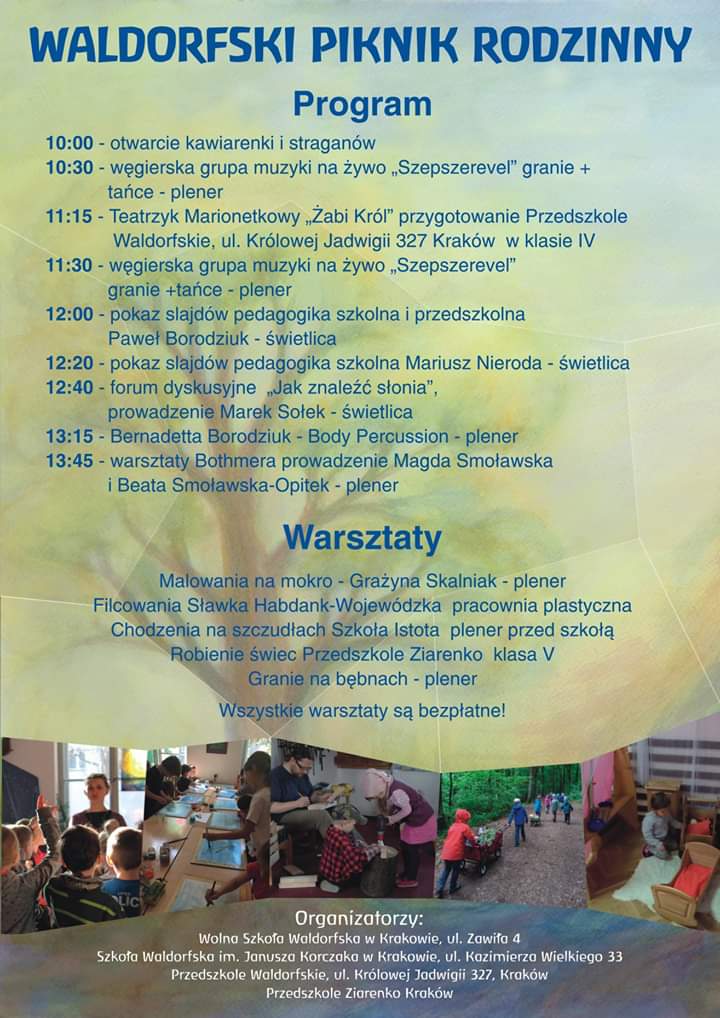
10-15. 16. 06. SUNDAY 14:00 és 20:45
Dla klimatu-warsztaty&koncerty / For climate-workshops&concert
https://www.facebook.com/events/2473284942957773/
Come and experience plenty of eco-atractions with Aeris Futuro Foundation It will be: Musically - a traditional Hungarian band will play Hungarian tunes - circle dancing for big and small - at 2.00 and 8.45 p.m. Group "Szépszerével" play "Csángó" –very lively, transelike, traditional music which originated from the Romanian region of Moldavia. The musicians are students of village music players - Gyulai Farkas plays the violin, flute and "kaval", Sámsondi Gergely plays "koboz" and cymbals. They often change instruments. They play and teach how to dance and sing. Most of the dances are circle dances so there's no need for a partner and the steps are easy even though the tempo might surprise you.
17. 06. MONDAY
on Monday we go to Warsaw
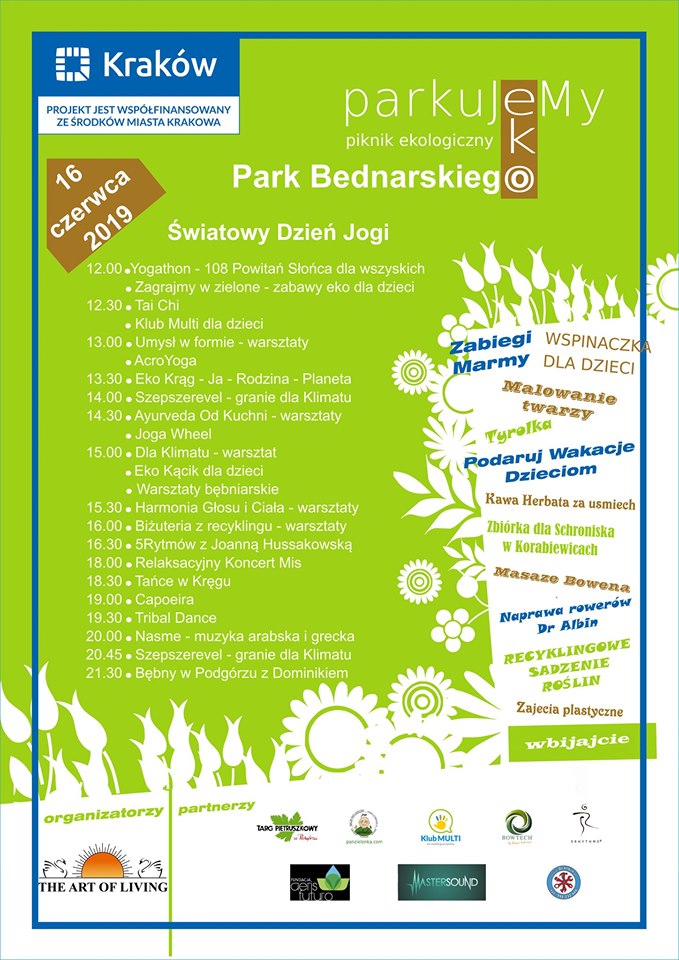
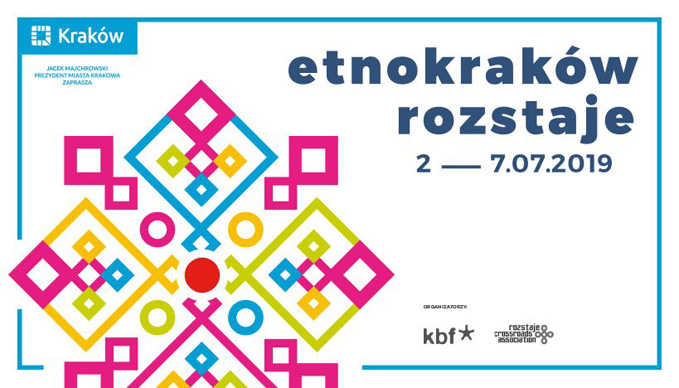


 English (UK)
English (UK)  Polski (PL)
Polski (PL)  magyar (HUN)
magyar (HUN) 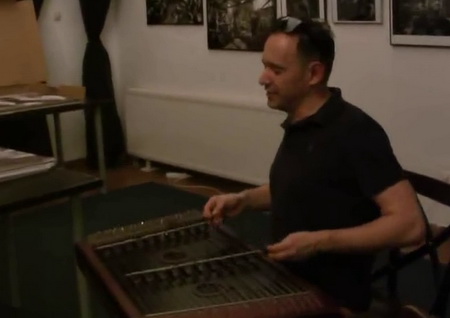

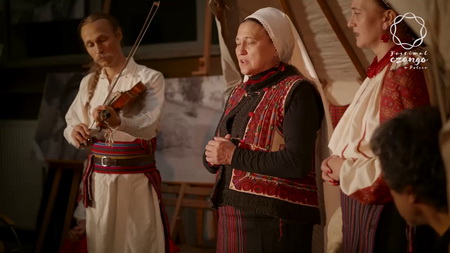
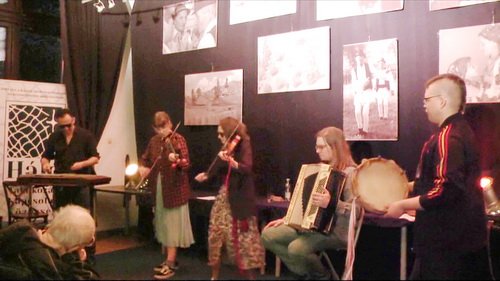
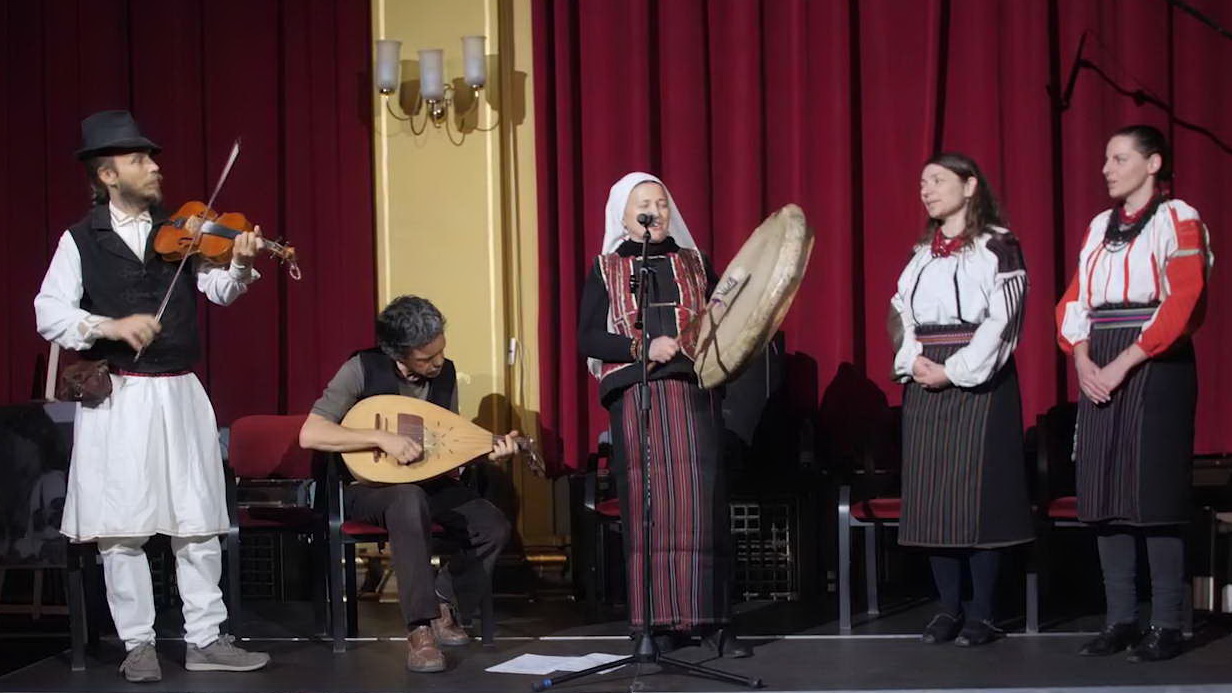
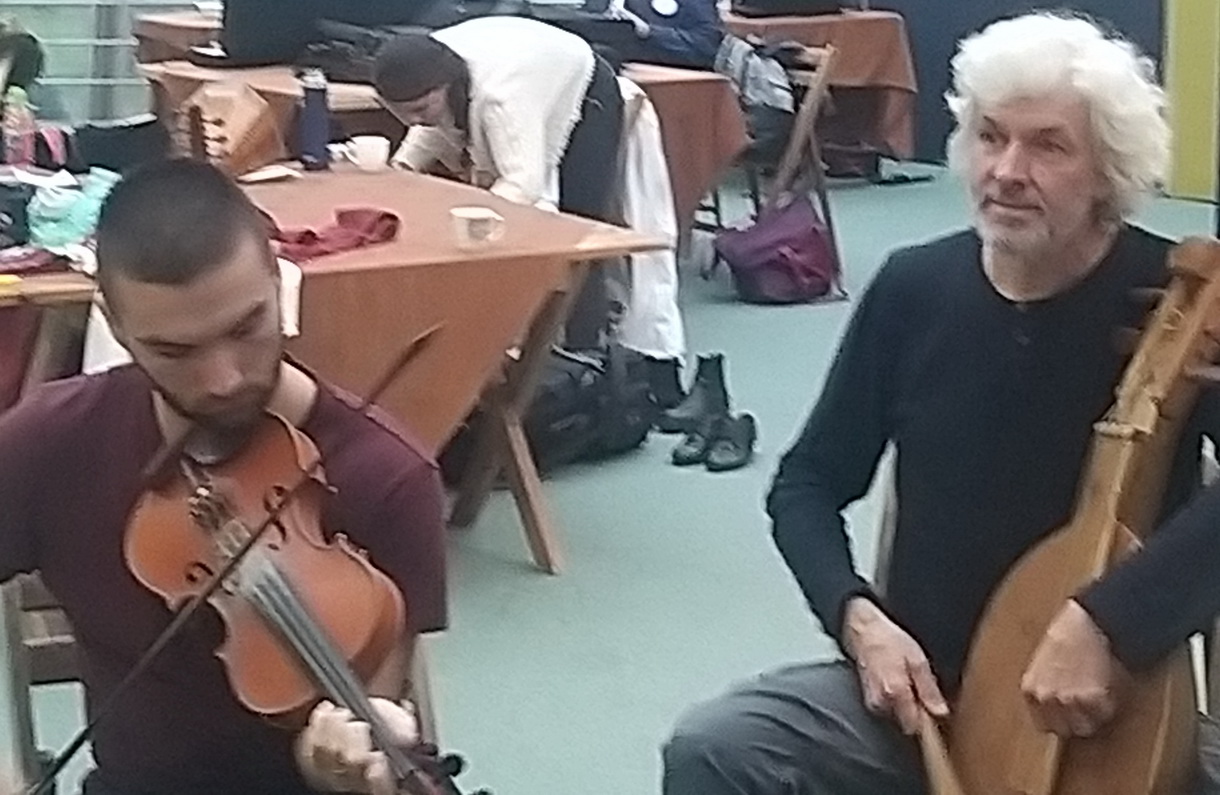
.png)
